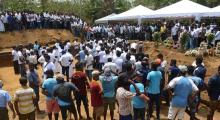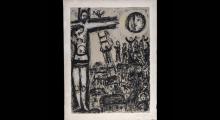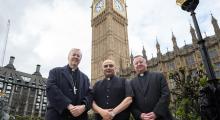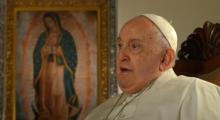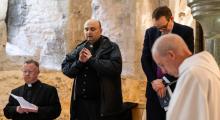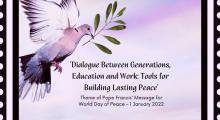Issued by the Catholic Center for Studies and Media - Jordan. Editor-in-chief Fr. Rif'at Bader - موقع أبونا abouna.org
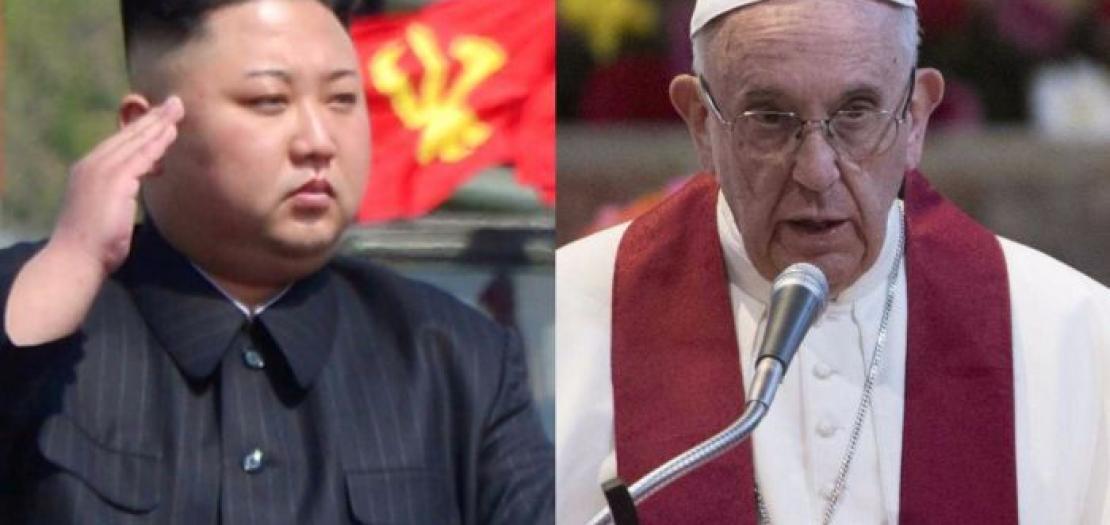
South Korean Bishop Lazarus You Heung-sik talks about the upcoming audience between Francis and President Moon who should bring him Kim Jong-un’s invitation to Pyongyang. Meeting at the Synod with the two Chinese bishops.
A visit of the Pope to North Korea would be “a gigantic step for a peaceful Korean peninsula”: this was said by the South Korean bishop of Daejeon Lazzaro You Heung-sik, synod member, during the daily briefing on the assembly taking place in the Vatican (3-28 October). The prelate also told of his meeting with the two Chinese bishops who arrived in Rome after the recent agreement on episcopal appointments between Rome and Beijing while Monsignor Bruno Forte, Archbishop of Chieti-Vasto, elected to the commission that will draft the final document, revealed that one of the two Chinese bishops was his student in Naples.
“We are the universal Church, we are all united. Until last year the whole world was talking about the risk of war breaking out in Korea, but in this year, thanks to the Holy Spirit, the situation has changed 180 degrees. A new relationship between the two Koreas was born, there was the meeting between President Moon Jae-in (South Korea) and Kim Jong-un (North Korea) on 27 April, a truly great success: I was watching television, crying and laughing. Then there was the meeting between Kim and Trump. I believe that North Korea is a country ready to open up, that is to renounce nuclear weapons, to become a new country. In this sense in September President Moon told President Kim: the best way for North Korea to enter the international world is to invite the Pope. Only the day before yesterday the president’s spokesman said that during the meeting, Kim replied: when the Pope came, we would give him a great welcome. Now President Moon will go to the Holy Father on 8 October next and they will speak. How beautiful it would be if the Pope went to Pyongyang! But in reality, there are many steps to take, even if the Holy Father’s visit would be pastoral. Some things must change, starting with the issue of religious freedom and the presence of priests, they are issues to be discussed”.
“I’ll say only one word: if the Pope goes, it will be a gigantic step for a peaceful Korean peninsula, and North Korea would thus enter the integrated world. I know how much the Pope prays, he has done so on several occasions in public, so that the Korean peninsula may find a future of peace”. The South Korean bishop said that he went to North Korea four times as president of Korean Caritas to bring humanitarian aid. As for the young South Koreans, “some may be afraid that by helping North Korea, South Korea will become poorer, jobs will be lost, but I see that this is a minority: most Koreans think that we should open our hearts to North Korea, that there are many things we can do together, starting with a railroad that connects the South and the North. Some people are a little scared, but I think that many people think it would be a good thing, that we should move forward”.
Monsignor Lazzaro You Heung-sik also told of the meeting at the Synod with the two Chinese bishops. “When I read the agreement between the Holy See and China I was really happy because this result was much desired both by John Paul II and by Benedict XVI and by Francis. And they have always asked the Korean Church for help with evangelization in China, where Christianity entered thanks to our laity. In the past, it was not easy but this news moved me. And then I came to Rome, where the two bishops and a priest arrived. I don’t speak Chinese but I understand the writing quite well, I approached them, at breakfast and lunch, I wrote my name in Chinese, we exchanged the phone number and then slowly our relationship grew. For me they are brothers to be loved, and moreover brother bishops at the Synod, even more to be loved. They had some difficulties because it was their first time as participants to a Synod. They treated me as an older brother because I am older than them. I would gladly go where they live and I would like them to come to me”.
The two Chinese bishops gave the Korean bishop their photo with the Pope, an image of Our Lady with Jesus, as well as some Chinese tea. “They leave us a little before the end of the Synod because they must leave, they are a bit sorry about that, but I know for them this beautiful experience of God is a grace that will bring many good fruits for China and for the world”.
Monsignor Bruno Forte also told an anecdote about one of the two Chinese bishops: “To my surprise, one of the two bishops came to hug me and said: “Don Bruno, do you remember me? I was your pupil”. In fact, I went to China as a guest of the Chinese Academy of Social Sciences to talk about Christianity, I had supervised a doctorate from a student. I had asked Young Paul II, and he said to me with a joke: “Go, go, heaven forbid I could go too! After the trip, I arranged for the opening of two scholarships for Chinese seminarians at the theological faculty in Naples where I taught, and one of the two studied ecclesiology in Naples, speaks Italian very well, and is now one of the two bishops at the Synod. What we see now is the fruit of many small signs that have been built over time”. To the bishops Monsignor Forte gave the book of his spiritual exercises before John Paul II in 2004, a way, he said, of remembering the Polish Pontiff.
During the briefing Forte said that “two great types of young people are emerging: the young people of the south of the world, protagonists of the migratory phenomena because they dream of a better future, young people of hope and desire, on the other hand especially in the West young people with so much fear, so much loneliness”. Migrants, especially “in a country like ours, are a precious force. Beyond their dignity as human persons, they are those who have allowed Italian companies to carry on: welcoming them is not only out of respect for human dignity but it concerns the interest of the country.
As for priestly celibacy, on which the intervention of the Belgian bishop Jean Kockerols posed the question of those “young people who, in their baptismal vocation, have discovered the call to the bond of marriage” but at the same time “would respond: “Here I am” if the Church were to call them to the priestly ministry”, Forte said, in response to a question from journalists, that “there has been no debate on this point: young people open themselves up to life and the future and there are young people who are open to the priestly vocation and the desire to give all their being to the future in the priesthood, therefore also accepting celibacy”. “In the reality of the Church - he continued - I still consider celibacy an important and precious fact for the priesthood. Certainly, it is a subject worth of reflection and attention, but not now: the viri probati issue has been going on in the reflection of the Church for several years if not decades”. As for Humanae vitae, he answered again to another question, “We have not spoken about it, I don’t think there have been any relevant elements: what counts in that message is the value that responsible procreation must have, a fundamental message that remains. This is a reflection that certainly deserves attention, I think that among the many challenges of this Synod it may come, but for now is not at the center”.
At the opening of the briefing, the Prefect of the Department of Communication, Paolo Ruffini, summarized as usual the speeches given yesterday afternoon and this morning, highlighting in particular the fact that the young people “took on a leading role” and took the floor several times, expressing great expectations from the Synod (”do not disappoint them,” said one of the panelists), and stressing that “the Church should set aside its weaknesses and start running again. Ruffini said that the idea of a pilgrimage to be made together with the young and synodal fathers to the Tomb of Peter was also proposed “and welcomed with enthusiasm”, as well as an initiative for the international Caritas to walk together on October 21.
To those who said that there would already be a draft of the final document, Monsignor Forte replied that “the commission for the drafting of the text met yesterday for the first time, I think it would be impossible in such a short time to write the text: clearly the two special secretaries are working on it, we have given ideas, contents and possibilities of schemes”, always keeping at the center of attention the young “who are a potential for the future without hiding their fragility and trusting in the ability of Jesus to positively transform everything”.


